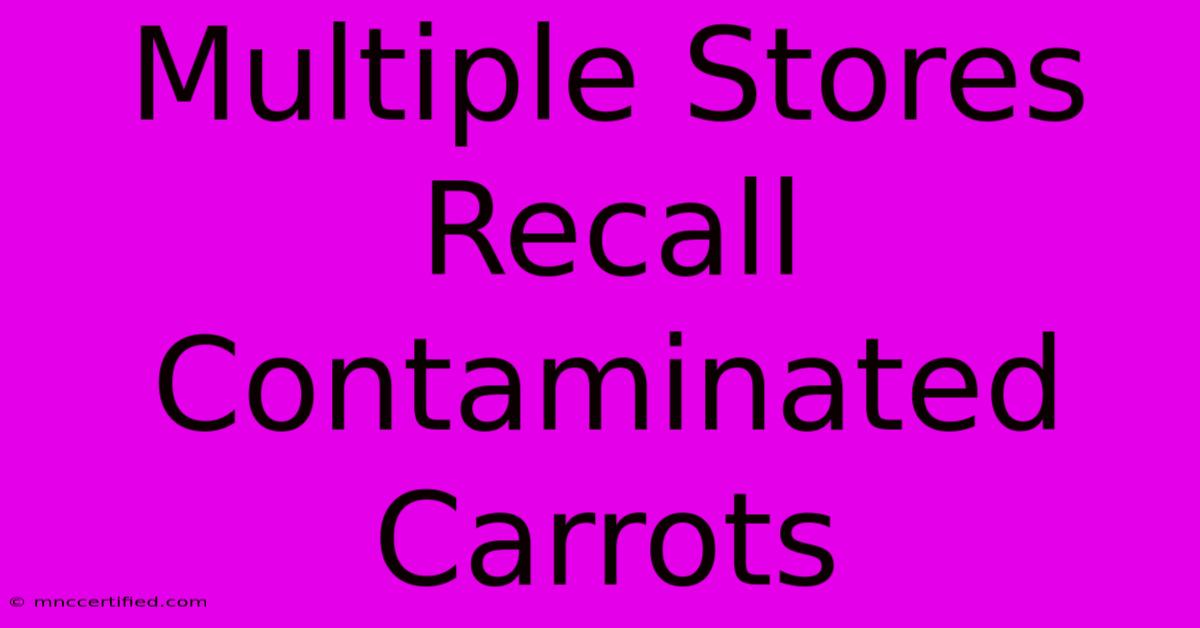Multiple Stores Recall Contaminated Carrots

Table of Contents
Multiple Stores Recall Contaminated Carrots: What You Need to Know
Several major grocery store chains have issued a recall of pre-packaged baby carrots due to potential Listeria contamination. This widespread recall highlights the importance of food safety and underscores the need for consumers to be vigilant when checking their produce. This article will detail the recall, explain the risks associated with Listeria contamination, and provide guidance on how to protect yourself and your family.
Which Stores Are Affected?
The recall currently affects carrots distributed by multiple large retailers across the nation. While the full list may vary depending on location, some of the stores involved include (but are not limited to):
- Kroger: Check your specific Kroger store's recall notices for affected product codes and dates.
- Walmart: Walmart has also issued a recall impacting several of its stores. Again, specific product details vary by location.
- Giant Food Stores: This chain has participated in the recall effort. Verify impacted products through their official website or app.
- Other regional and local chains: Many smaller grocery stores may also be involved. It's crucial to check your local store's website or contact them directly.
Note: This list may not be exhaustive. Always check the official recall notices from the FDA and the involved retailers for the most up-to-date information.
Why Are Carrots Being Recalled?
The recall is due to the potential presence of Listeria monocytogenes, a bacterium that can cause listeriosis. This serious infection can be particularly dangerous for pregnant women, newborns, older adults, and people with weakened immune systems.
Understanding Listeria Contamination
Listeria monocytogenes is a resilient bacterium that can survive in refrigerated temperatures. This makes it a particular concern with ready-to-eat produce like pre-packaged baby carrots. Symptoms of listeriosis can include fever, muscle aches, and gastrointestinal problems. In severe cases, it can lead to more serious complications, including meningitis.
How to Identify Recalled Carrots
Recalled products will typically have specific product codes and "best-by" dates. Check the packaging carefully. The official recall notices from the FDA and the involved retailers will usually provide detailed information about the affected products, including:
- Brand name: Pay close attention to the brand of baby carrots.
- Product code: This is a unique identifier printed on the packaging.
- "Best by" or expiration date: The date range of affected products will be clearly specified.
- Packaging size: The weight or quantity of the affected packages.
What to Do If You Have Recalled Carrots
If you have purchased baby carrots from any of the affected stores and they match the descriptions in the recall notice, do not consume them. Instead:
- Discard the carrots immediately. Do not attempt to clean or reuse them.
- Wash your hands thoroughly after handling the recalled product.
- Contact the store where you purchased the carrots to inquire about a refund or replacement.
Preventing Future Contamination
While this recall highlights the importance of vigilant food safety practices by retailers, consumers also play a vital role. To reduce your risk of foodborne illnesses, consider these steps:
- Thoroughly wash all produce: Even if not part of a recall, washing produce before consumption is crucial.
- Cook food to the correct temperature: Proper cooking helps eliminate harmful bacteria.
- Refrigerate perishable items promptly: Store produce correctly to prevent bacterial growth.
- Practice good hygiene: Wash your hands frequently, especially before preparing food.
- Stay updated on food recalls: Regularly check the FDA website and your grocery store's websites for recall information.
This recall serves as a reminder that food safety is paramount. By staying informed and following these precautions, you can protect yourself and your loved ones from potentially harmful bacteria. Remember to always check for updated information on the FDA website and the websites of the affected retailers.

Thank you for visiting our website wich cover about Multiple Stores Recall Contaminated Carrots. We hope the information provided has been useful to you. Feel free to contact us if you have any questions or need further assistance. See you next time and dont miss to bookmark.
Featured Posts
-
Trump Dance In The Sports World
Nov 19, 2024
-
Rebekah Vardy Wagatha Christie I M A Celeb Row
Nov 19, 2024
-
Gmail To Fight Spam Emails
Nov 19, 2024
-
Bdo Appointed Super Micro Auditor
Nov 19, 2024
-
Oxford Insurance 87th And Halsted
Nov 19, 2024